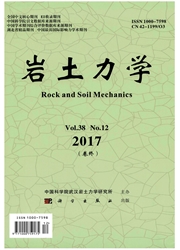

 中文摘要:
中文摘要:
建筑物地基或土坡中的土体在受到地震或其他动荷载作用前往往处于复杂的初始应力状态,对原有的DTC-199型周期扭转荷载三轴仪进行简单的改造后,可以进行压实黄土在这种固结应力状态下动强度的试验研究。试验结果表明,在其他初始固结应力条件不变时,初始主应力方向角a0对压实黄土的动强度具有显著的影响,初始中主应力系数b0对动强度的影响较小;随着d0的增大,动强度逐渐降低,并在a0=90°时达到最小值,最大降幅在40%左右;b0对压实黄土的动强度的影响具有放大效应和区间效应,b0从0增大至0.5时,动强度逐渐增大,b0从0.5增大至1时,动强度逐渐减小,增加的幅度小于降低的幅度约5%。
 英文摘要:
英文摘要:
The soils under the foundation of building or within the slope are usually in complex initial stress state before subjected to cyclic loading induced by earthquake or other dynamic loadings; after reforming the DTC-199 torsional cyclic load triaxial apparatus, the dynamic strength of compacted loess can be tested under this consolidation stress conditions. Results show that the initial angle a0 of principal stress has a considerable influence on the dynamic strength of compacted loess when other initial consolidation stress conditions are fixed; the initial coefficient b0 of intermediate principal stress has little influence on the dynamic strength of compacted loess; with the increase ofao, dynamic strength reduces gradually and it reaches minimum when ao is 90°; maximum reduction range is about 40 %. The initial coefficient of intermediate principal stress has interval effects and amplification effect on the dynamic strength of compacted loess. When b0 increases from 0 to 0.5, the dynamic strength increases; and when bo increases from 0.5 to 1, the dynamic strength decreases; the rate of increasing is less than rate reduction about 5 %.
 同期刊论文项目
同期刊论文项目
 同项目期刊论文
同项目期刊论文
 期刊信息
期刊信息
